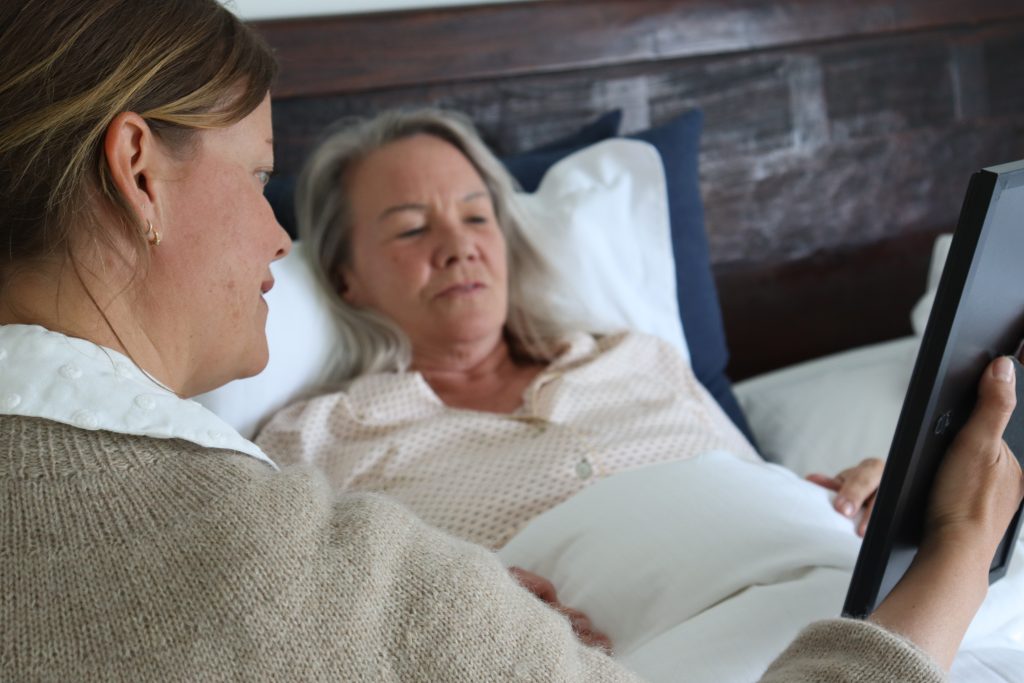Terminal care is when the patient is irreversibly dying, as opposed to palliative care. This is the terminal phase of a disease. This terminal phase typically lasts for days to weeks. The lifespan is therefore limited in the terminal phase. Terminal care focuses on providing compassionate and relieving care. There is also a focus on providing care, support and reassurance to relatives during this difficult time.
In the terminal phase, there is no treatment available to prevent organ failure leading to death. This means that only relieving care is available, not treatment. During this terminal phase, it is important to have a safe and calm environment. Terminal care can be provided in a hospital, hospice or in your own home as a home hospice. This depends on the wishes of both the patient and their relatives.
Symptoms and signs of the terminal phase
There are a number of terminal symptoms and signs. These symptoms include:
- Increased need for sleep and drowsiness
- Physical impairment
- Less contact with the surroundings
- Affected level of consciousness
- Impaired orientation, possibly also confusion
- Reduced concentration and attention
- Reduced interest in food and drink
- Difficulty swallowing tablets
As death approaches (it can be days or hours), the above symptoms will intensify. In the terminal phase, the patient is usually bedridden. In addition, the terminal phase may be affected by an underlying disease, such as breathing difficulties in heart failure.
Terminal care at home
Most deaths today still take place in an institution, but studies have shown that most terminally ill patients actually want to die at home. There are several reasons why this does not always happen. For example, a patient may be admitted to hospital as an emergency in the last days of life due to the insecurity of relatives, lack of resources in case of unforeseen complications, an uncontrollable worsening of the patient’s symptoms and the breakdown of the network.
A private nurse can create a space for you to die at home with your loved ones around you. Having nurses specialized in terminal care close by provides reassurance for both the dying person and their relatives.
A private nurse can be present to detect any deterioration or change in the dying person’s condition in time to address these needs before they become uncontrollable.
If terminal care is provided at home, many people find it very helpful to receive professional respite care and assistance so that relatives do not have to do it all by themselves. It may also be that the patient has no relatives and would feel more comfortable being surrounded by nurses.
If you are a relative of a terminal patient, a private nurse can take over the nursing care and practical coordination. This gives you more time with your loved one and you can also sleep soundly knowing that someone is taking care of your loved one.
A private nurse can be present in the home as often as needed and can act as a complement to the municipal home care services. Find out how to choose the right private nursing service.
Subsidies for terminal care
It is possible to get a subsidies for terminal care. If you have a terminal declaration, a terminal allowance is automatically granted. This means that the patient receives a 100% reimbursement for all prescribed medicines.
Additionally, home care is reimbursed at 50% of the self-payment. However, if you are a member of Health Insurance Denmark Group 1 and Group 2, the subsidy is a maximum of DKK 12,000. To receive the subsidy, it is a requirement that the terminal care takes place in the patient’s own home in Denmark, and the care must be provided by a licensed nurse.
The aforementioned terminal declaration must be completed by the doctor and sent to the local authority. The declaration states that the patient has a limited life expectancy and this qualifies for the reimbursement. In addition to home nursing care, the dying person and their relatives are also entitled to assistance, such as nursing supplies, nutritional products, reimbursement for psychological and physiotherapy services, and nutritional products.

Learn more about terminal care:


